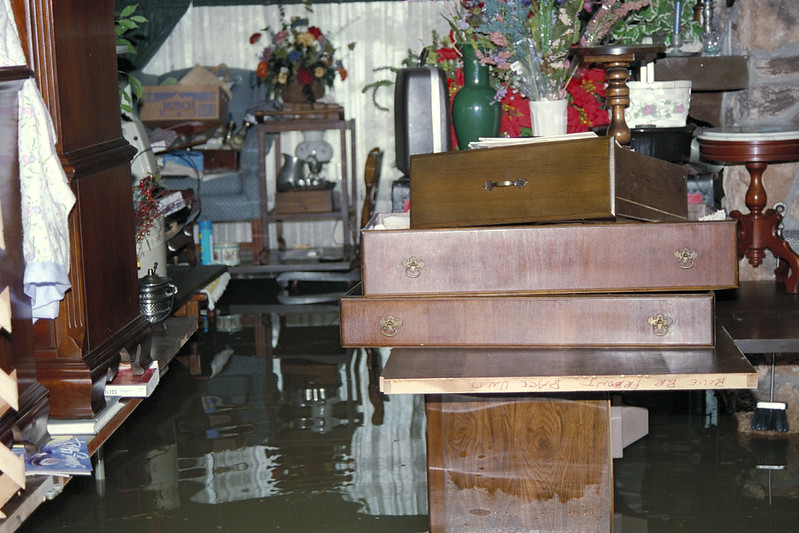
No one wants to go down to their basement and see water. Many people store their holiday décor, furniture, family mementos and more downstairs, so finding them in standing water can be devastating. If your basement has been finished as family room, man cave or a playroom for the kids many items cannot be used after water damage. There is often a large amount of work that needs to be done for your basement to be safe and clean again. In addition, after a basement flood you should consider corrective measures, like basement waterproofing, to prevent future flooding.
Common Causes for Basement Floods
Basements are prone to flooding, but even so there is usually a reason for the water.
- Natural disasters, storms and torrential rainfall
- Plumbing Leaks – Plumbing leaks are caused by a burst or leaking pipe, waste line, washing machine supply hose or water tank or heater. You can prevent further daman by turning off your water via the water shut-off valve before calling a professional. A plumber with specific tools may be required if your water shut off valve is buried underground. Plumbers can proved a high capacity pump that will remove water from your basement before it is allowed to sit and saturate carpeting or drywall.
- Sewage Leaks Sewage leaks are caused by a septic tank backup or clogged sewer line. The cleanup process can begin immediately by turning off all faucets and not flushing toilets until the leak has been repaired. The real cleanup should be left to the professionals however, sewer leaks can cause many health hazards if not handled correctly and quickly. You will need to call a specialist if your septic tank is backing up. If the outside sewer service is causing the issue you will need to call your city sewage department to check the neighborhood for clogs.
- Foundation Leaks – Basement foundation leaks are caused by excessive amounts of rain, poor yard drainage and sewer backups, seeping water into your basement from faults in the foundation. In this case, you’ll need to call a foundation contractor to inspect your basement, find the cause of the flood and suggest a solution to sealing your foundation from future leaks.
What to Do If Your Basement Floods
Never enter a flooded basement. You should never go in your flooded basement if it is caused by the weather. If heavy rainfall is the cause of flood, ensure your family is safe. Be sure to create flood safety plan before potential flooding so your family can follow the plan and remain safe in inclement weather. If the flood has been caused by a ruptured pipe you can take immediate action.
Shut off the power to your home immediately if the circuit break is not located in your basement. Any electrical appliance that comes in contact with the water can be very dangerous, so cut the power as soon as you notice the flooding. Many circuit breakers are located in easy to access locations like your garage, or may be outdoors by your meter if the home is older.
Remove the Water
When the area is safe from electrical devices, you can begin removing the water and survey the damage. If your basement is flooded, your sump pump has failed; you will likely need to purchase a new one and use it to drain any remaining water. The pump will not be able to remove every trace of water so a mop and towels can be used to clean up the rest.
If there is more than two feet of water in your basement, call a basement restoration specialist to help you dry out the basement instead of attempting to remove the water yourself.
It is key to remove as much water as quickly as possible. Mold can quickly grow in a damp environment and can increase the damage to your property and cleanup costs.
Deal with Your Damp Objects
You cannot leave any damp items behind when trying to effectively dry your basement. Remove any items that got wet including furniture and place them in an area like the garage where they can dry out. Hopefully, your insurance company can compensate you for the damaged items and the cost of repairing the basement and removing mold. File an insurance claim as soon as possible after the flood; your insurance company may compensate you for the cost of your damaged items, fixing your basement, and repairing any mold.
Any wet carpet should be removed immediately. It may be salvageable but often the carpet and the padding underneath will all need to be replaced.
Dry the Area
Your basement will not dry on its own. Renting fans or industrial blowers and using a dehumidifier will help your basement dry faster, remove excess moisture and minimize mold growth, You’ll probably need to buy or rent fans or even industrial blowers.
Prevent Mold Before It Grows
Damp, dark conditions allow mold to thrive. Mold can pose a serious health risk and if you find it in the weeks after a flood, you may need to remove sections of drywall. It can be beneficial to call in basement cleaning professionals to properly clean your damaged area.
Prevent Future Floods
After the flood happens, try to figure out what caused it in the first place. Did a heavy storm flood your lawn and drain into the basement? Do you have cracks in your foundation? Do you need to replace your sump pump or upgrade it to a newer model? Talk to a professional to learn how to update your basement, fix your foundation, or change your landscaping and gutters to prevent another flood. Basement waterproofing may be a good investment to ensure you are protection from any future flood damage.
Preventative Measures
Working to prevent floods before they happen can help with your peace of mind. Be sure gutters are clean, downspouts are positioned correctly away from the foundation, and your sump pump is working correctly.
How Much Does It Cost to Clean Up Your Basement?
Depending on the cause of the flood, the professionals you hire will vary. Cost is dependent on how much water entered your basement and how quickly the water was addressed and removed.
According to Angie’s List, a minor flood with several inches of water could cost $10,000 to repair, while a severe flood could cost anywhere between $25,000 – $50,000.
You may be able to cut costs but taking care of the cleanup yourself. However, there are ways you can some aspects of a basement cleanup and repair – like electrical work and toxic septic waste – should be only be handled by the pros, removing carpet and drywall can be done easily.
Basement floods are a costly headache for homeowners, but once they happen, you can take steps to safeguard your property and prevent future flooding. After following the steps mentioned above, it is advisable to reach out to a basement waterproofing specialist. They can help prevent a distressing basement flood from happening again.
